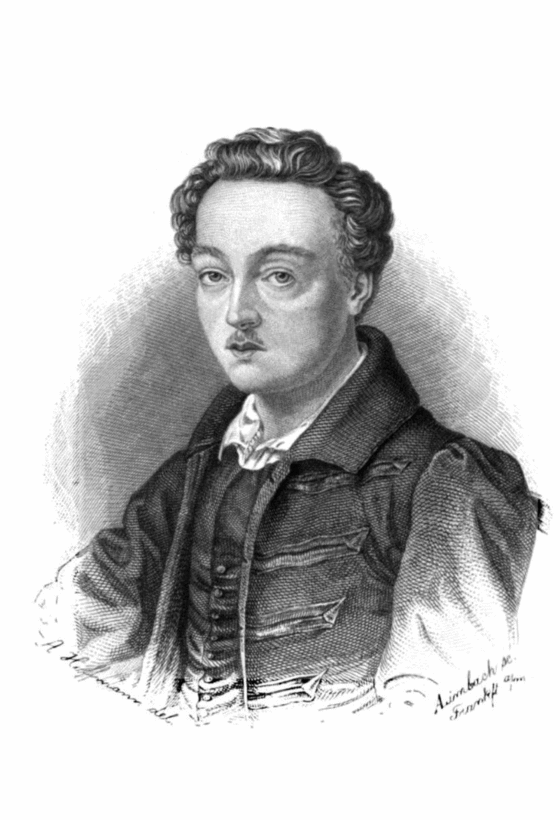
100 Years of the Georg Büchner Prize
Prof. Dr. Christian Klein / German Studies
Photo: UniService Transfer
100 years of the Georg Büchner Prize
Prof. Dr. Christian Klein on a literary prize for authors who have rendered outstanding services to the German language.
The Georg Büchner Prize celebrates its 100th anniversary this year. Who was Georg Büchner anyway?
Klein: Georg Büchner is one of the most important authors of the Vormärz period. He was born in Hesse in 1813 and died in Zurich in 1837. Despite his short life, he produced three dramas(Danton's Death, Leonce and Lena, Woyzeck as a fragment) and the story Lenz, all of which are now part of the canon of German literature. In the political pamphlet Der hessische Landbote, Büchner agitated against feudal rule and for revolution, for which he had to go into exile. Büchner also negotiated political issues in his literary texts, which are highly innovative in terms of style and artistic form, and there too he takes the perspective of the oppressed.
What was the original reason for establishing the prestigious literature prize?
Klein: The establishment ultimately goes back to the initiative of Julius Reiber, a member of the Hessian state parliament, who in 1922, a few years after the founding of the "Volkstaat Hessen," wanted to create a "Georg Büchner Prize" to be awarded annually on "Constitution Day" to artists from Hesse or working in Hesse. In this way, he wanted to recognize the importance of culture for democratic society and the republican nature of the state. Heated debates followed, in which very fundamental political issues were at stake, which were linked to the name of the planned prize, because the "poet revolutionary" Büchner was a red rag for conservatives in particular. They brought Goethe into play as an alternative patron of the name, but could not prevail, and so it was decided to establish the Hessian State Prize for All the Arts with the name Georg Büchner Prize, which was awarded for the first time in 1923.

Georg Büchner, illustration after a drawing by the painter August Hoffmann in a French edition of his works from 1879
in the public domain
In 1951, the prize was transformed from a general cultural prize into a literary prize, and the prize money has increased over the years. Does this prize honor authors who have rendered outstanding services to the German language? Who can you think of off the top of your head?
Klein: You can only tell with some historical distance to what extent the texts of individual authors have had a special impact. But if you look at the list of prizewinners since the prize was rededicated as a literature prize in 1951, you will find many who have had a significant influence on German literature: In the field of poetry, for example, Gottfried Benn, Günter Eich, Paul Celan and Ingeborg Bachmann; in the field of drama, Thomas Bernhard, Peter Handke, Heiner Müller and Elfriede Jelinek; or Günter Grass, Heinrich Böll, Wolfgang Koeppen and Uwe Johnson, who helped the German-language novel to achieve world renown after 1945.
To this day, the selection process is not transparent and is therefore highly controversial. The taz writes: "The Georg Büchner Prize, however, is a shitty devil in search of the biggest pile. The average Büchner Prize winner is between 50 and 70 years old, mostly male, and has already won eight to twelve other literary prizes. The Büchner Prize cements already cemented significance." So no chance for newcomers?
Klein: With regard to the history of the prize, the criticism of the homogeneity of the award winners is justified overall, but if you look at the prize winners of the last few years, then since 2017 female and male authors have been awarded the prize in turn, and four of those awarded since 2017 are in their mid to late thirties. So something seems to be changing there. However, the Büchner Prize is not fundamentally designed as an award to recognize newcomers or debut authors. According to the statutes, the prize should go to writers "who have distinguished themselves through their work and who have made a significant contribution to shaping contemporary German cultural life. So the focus is more on established writers, but I don't find that problematic - there are other prizes and awards for authors at the beginning of their careers.
In addition, the Büchner Prize winner is supposed to be suitable for school reading. What does that mean?
Klein: That seems to me to be an expectation that is rather applied to the prize from the outside, but actually articulates a matter of course, because if the award-winning authors are selected according to the criteria formulated in the statutes, their works are actually suitable for school reading per se.
The proportion of women among the award winners is still very meager, with only 12 female writers. Why is that?
Klein: It's due to the structural discrimination against women in the literary world, which has led and continues to lead to the marginalization of female productivity in the literary field. For centuries, women were denied the ability to be originally creative - as "natural experts on feeling," they were tolerated as a projection surface in poetry at best. The "literary pope" Marcel Reich-Ranicki, for example, reviled Ingeborg Bachmann in the early 1970s as a "fallen lyricist" because she presented narrative texts. At the beginning of the new millennium, when a series of debut novels by female authors appeared in a short period of time, the feuilleton spoke both disparagingly and patronizingly of the "literary miracle of the Fräulein. And the aggressiveness that Elfriede Jelinek's drama has met with is certainly not only due to divergent assessments of the literary quality of her plays.
In 2022, Emine Sevgi Özdamar was the first author whose native language is not German to be honored. That was a novelty, wasn't it?
Klein: It depends on how closely you look at where you start. The 1972 prize winner, Elias Canetti, for example, grew up with Ladino ("Judeo-Spanish") as his mother tongue and only began learning German when he was eight years old. George Tabori, who received the Büchner Prize in 1992, grew up between different languages; he said of his linguistic socialization: "Hungarian is my mother tongue, English my father tongue, German my aunt tongue." Presumably there were other prize winners who can show a similarly rich language biography - and there will certainly be more diversity among the prize winners in this respect in the future.
Which German-writing author(s) would you consider a candidate for this literary prize?
Klein: Sasha Marianna Salzmann, for example, because she writes impressive literary texts that are absolutely relevant to our times - contemporary literature in the best sense.
Uwe Blass
Prof. Dr. Christian Klein teaches and conducts research in the Department of Modern German Literary History / General Literary Studies in the Faculty of Humanities and Cultural Studies.
